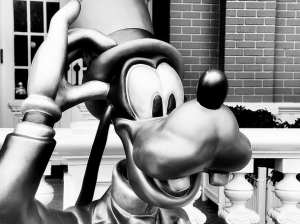Overcoming Self-Criticism Through Humor and Failure
“You yourself, as much as anybody in the entire universe, deserve your love and affection”
 I used to suffer greatly from a bad case of self-criticism, in my teenage years, it was so severe that I could never ask a girl out on a date. I feared that she’d say “no” and I’d end up spending the next week getting down on myself for my failure.
I used to suffer greatly from a bad case of self-criticism, in my teenage years, it was so severe that I could never ask a girl out on a date. I feared that she’d say “no” and I’d end up spending the next week getting down on myself for my failure.
Finally, at age 17, I hit “threshold” and decided to get rejected by 10 girls in one day. I figured the best way out of my prison of fear was to face it head on.
I promised myself that if I got 10 rejections; I’d treat myself to a trip to Hawaii. By setting it up that getting 10 rejections equaled my ticket to Hawaii, I hoped to sidestep getting down on myself for being rejected so many times.
So I began this personal assignment at the university bookstore. As I approached the first girl, my knees were shaking and a bead of sweat dripped down my face.
Finally, I went up to an attractive young woman and said, “hello.” This girl turned to face me and quickly noticed that I was shaking and sweating.
With real concern she said, “Are you alright? Do you need me to call an ambulance?” She thought I was having some kind of seizure.
I told her she didn’t need to call an ambulance
and an awkward conversation ensued. Finally, I asked her out, to which she nicely said she had a boyfriend and was not available.
She asked me once again if I was okay; I assured her I was. I walked away and took out a note card and marked down “one rejection.” Nine more to go.
I continued to gather rejections and with each girl I approached, it got easier. Soon, I had a “script” I was using that made it kind of fun. I was proud of myself for facing this formerly debilitating fear.
By defining success as actually getting 10 rejections, I saw that I was able to sidestep what would have previously been horrendous self-criticism for “failing.” Yet, the seventh woman I approached ruined my momentum.
By now I was pretty relaxed. I walked up to the young woman and said, “I’m new here and I’m trying to meet people. You look like a nice person. Would you be interested in having lunch together some time?”
The girl looked at me for a long moment, then said, “Sure.” It was at that moment I realized I had no “script” for “sure.” It hadn’t occurred to me that someone might say “sure.”
for a long moment, then said, “Sure.” It was at that moment I realized I had no “script” for “sure.” It hadn’t occurred to me that someone might say “sure.”
I said, “Sure what?” Finally, she had to convince me to write her phone number down. Soon, other “yeses” followed. In fact, I got 8 straight dates.
It was actually hard to get my three final rejections, but I finally managed to do so by acting like a jerk as I asked women out. So I went to Hawaii and my love life was set for my freshman year. More importantly, I realized that self-criticism was something I could circumvent by doing something differently in my head.
I am still committed to outmaneuvering the cancer of self-criticism. Rather than rewarding myself for failure—as I did with my “rejection experiment,” I’ve turned to other methods.
For example, recently I saw I was criticizing
myself for not getting enough stuff done during the day; this is one of my “inner critic’s” favorite themes.
Since I kind of knew how my inner critic would “operate” in this situation, I was on the lookout for my self-critical inner dialogue. Predictably those thoughts were right on schedule.
Anytime I tried to relax for a moment, my inner critic was right there to scare me back into action. However, since I had anticipated this voice and knew how it worked, it didn’t fully “get” me.
It was as if my inner critic was over in the corner yelling, rather than being inside my head screaming at me. It made all the difference in the world. I could feel some peace—even with my inner critic trying to trip me up.
So anticipating your inner critic and knowing how it operates is one good method to lessen its impact. Fortunately, there are many antidotes to the dis-ease of self-dislike. I’ll briefly outline one more of my favorites.
I’ve noticed that the voice of self-criticism always speaks inside my head with a certain urgency, condemning tone. If I change the tone in some funny way then the “sting” of self-criticism disappears.
Over the years, I’ve come to use a method
 I affectionately call “The Disney Voice.” In this technique, I lessen the impact of any self-critical thoughts by changing the tone of my inner dialogue to sound like a Disney character.
I affectionately call “The Disney Voice.” In this technique, I lessen the impact of any self-critical thoughts by changing the tone of my inner dialogue to sound like a Disney character.
For instance, if I notice I’m putting myself down for being late to an appointment, I might use the tone of Mickey Mouse instead of my normal tone. I imagine Mickey talking to me in his very high pitched tone, saying stuff like “You’re going to be late again.”
It’s hard to take such a high-pitched voice seriously. Depending on my mood, sometimes I use the voice tone of Donald Duck (lisp and all), or perhaps the forgetful, anxious fish from Finding Nemo (played by Ellen Degeneris).
Whichever Disney character you find to be humorous is the right one for you. By substituting that character’s voice tone for your normal one you’ll find that all the power of your self-critical thoughts quickly evaporate.
I enjoy making fun of my self-critical thoughts. Using the “Disney Voice” method gives me a quick moment of perspective and humor. I’ve learned that laughing at my neuroses is a lot more fun and helpful than disliking myself.
At one time my inner critic ruled my life. But now I know its methods, what it says, and how it says it. By anticipating its ways and making fun of my inner critic, I have gained the freedom to be more of who I am…

